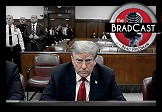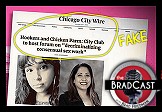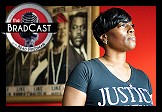 It's bad enough that the U.S. Department of Justice (DOJ), based upon deeply flawed opinion memos, issued by its own Office of Legal Counsel (OLC), believes a sitting President cannot be prosecuted while in office for his or her crimes.
It's bad enough that the U.S. Department of Justice (DOJ), based upon deeply flawed opinion memos, issued by its own Office of Legal Counsel (OLC), believes a sitting President cannot be prosecuted while in office for his or her crimes.
Now, 43 Republican Senators have sought to justify their "not guilty" votes in Donald J. Trump's second impeachment trial based on the specious assertion that an impeached President cannot be tried in the Senate for crimes committed while in office after he/she is no longer in office. That disingenuous notion is at odds with historical Senate precedent, the opinions of more than 170 legal scholars from both the Right and Left, and a simple reading of the plain text of the U.S. Constitution, not to mention the Senate's own decisive, bi-partisan, 56-44 majority vote at the start of this latest Senate Impeachment trial establishing that such a trial is indeed Constitutional.
Obviously most of the 43 "impartial" Republican jurors --- a number of whom share responsibility for the insurrection because they either directly perpetrated or failed to timely refute the Big "Stop the Steal" Lie --- latched onto the "no jurisdiction" defense in a desperate effort to erect plausible deniability for themselves. A fig leaf, if you will, designed to conceal their own duplicity and cowardice. Indeed, the remarks by Minority Leader Mitch McConnell (R-KY) delivered on the floor of the Senate immediately after he cast his "not guilty" vote reveal that the factual case presented by the House Managers was both clear and convincing.
For that reason, an historically huge, bi-partisan, 57-43 majority of the U.S. Senate found Trump guilty as charged of "Incitement of Insurrection". That there were enough misinformed, duplicitous or simply cowardly Republican Senators to prevent the two-thirds vote required to meet the incredibly high bar for conviction under Senate Impeachment rules is of little moment.
A political impeachment process is very different from a legal proceeding. There are, in fact, grave statutory crimes at the heart of Trump's most recent Article of Impeachment, including 18 U.S. Code § 373 - Solicitation to commit a crime of violence; 18 U.S. Code § 2383 - Rebellion or insurrection; and 18 U.S. Code § 2384 - Seditious conspiracy. With that in mind, the DOJ's failure or refusal to prosecute the former President could result in impunity with respect to an Office that is already considered the most powerful on earth.
Trump's attempted coup may have failed, but if we cloak the Office of the President with impunity, we invite a more skilled, future demagogue to do anything --- legal or illegal --- to retain power. To counter that more-serious-than-ever concern, the DOJ, under the leadership of Attorney General-designate Merrick Garland, must investigate and prosecute the former President for violations of applicable federal laws...
Criminal incitement
House Manager Jamie Raskin (D-MD), according to The New York Times' coverage of the Impeachment Trial, forcefully argued that "Trump cultivated, incited and then showed no remorse" for the deadly January 6 insurrectionist attack on the U.S. Capitol.
McConnell's remarks immediately after he voted to acquit, confirm that the core of the House Managers' case was irrefutable.
"American citizens attacked their own government," he observed. "They did this because they had been fed wild falsehoods by the most powerful man on Earth --- because he was angry he'd lost an election."
"There is no question that President Trump is practically and morally responsible for provoking the events of that day," the Minority Leader added.
Despite the fact that it isn't necessary to prove that a President violated a criminal statute in order to sustain a case for impeachment, McConnell noted that the Article of Impeachment included the word "incitement". The Kentucky Republican offered this reference in a futile effort --- contradicted by McConnell's very own words --- to suggest that this somehow justified his "not guilty" vote.
In truth, McConnell's remarks directly highlight that the House Managers succeeded in their effort to prove that Trump had indeed "incited" the insurrection, according to 18 USC § 2383, which applies to --- and bars from future elected office --- anyone who "incites" an insurrection.
The First Amendment, contrary to legally dubious assertions by Trump's defense attorneys, does not protect incitement to violence. As defined by the U.S. Supreme Court in Brandenburg v. Ohio (1969), speech is prohibited where it is (1) "directed at inciting or producing imminent lawless action", and (2) "likely to incite or produce such action." (Emphasis added.)
McConnell's own observations underscore the compelling nature of the House Managers' argument that the words uttered by Trump on January 6 --- especially when placed in the context of the former President's months-long effort to falsely convince his prone-to-violence followers that the election had been stolen --- were both intended to and likely to incite the violence that ensued.
As even McConnell, as a Senate juror, found (emphasis added)...
It is not just his [Trump's] endorsement of remarks in which an associate urged 'trial by combat'. It was also the entire manufactured atmosphere of looming catastrophe; the increasingly wild myths about a reverse landslide election that was being stolen in some secret coup...
The leader of the free world cannot spend weeks thundering that shadowy forces are stealing our country and then feign surprise when people believe him and do reckless things.
The violence that ensued following Trump's remarks at his "Save America March" on January 6 was "imminent". It was certainly more imminent than the on-air remarks made by radio shock jock Hal Turner, who was convicted of incitement. In response to a decision by a 3-judge panel to uphold Chicago's handgun ban, Turner said, "These judges deserve to be killed." By contrast, Trump not only incited his mob to "fight like hell" but also sent them directly to the Capitol to "Stop the Steal" as the 2020 Electoral College votes were being formally affirmed by a joint session of Congress overseen by the Vice President of the United States.
Trump's incitement to violence, moreover, didn't end at the close of the "Save America" rally in front of the White House.
"Even after it was clear to any reasonable observer that Vice President Pence was in danger…even as the mob carrying Trump banners was beating cops and breaching perimeters," McConnell added, "the President sent a further tweet attacking his Vice President." That tweet was rebroadcast over a bullhorn by an insurrectionist --- a broadcast that was immediately followed by the mob's chant to "Hang Mike Pence!"
Any doubts about Trump's criminal state of mind were eliminated by the revelation that, in the very midst of the carnage of the ongoing attack, Trump refused to comply with a desperate plea from House Minority Leader Kevin McCarthy (R-CA) to call off his attack dogs. According to a Republican Congresswoman briefed by McCarthy, Trump simply replied during the "shouting-match" phone call: "Well, Kevin, I guess these people are more upset about the election than you are."
Likely to prosecute?
At the close of the second day of Trump's second Impeachment Trial, former U.S. Solicitor General Neal Katyal told MSNBC's Lawrence O'Donnell that the most significant audience of the proceedings was not the Republican Senators. Instead, he argued, the most important audience is the yet-to-be confirmed Attorney General Merrick Garland, whom Katyal described as "the most sober non-political person" he'd ever met in D.C.
The evidence presented by the House Managers was so compelling that "it would be a very hard decision for Garland not to prosecute" the former President, Katyal opined.
The FBI and DOJ will not be operating under the same time or evidentiary constraints imposed on the House Managers. They could, for example, directly question White House insiders; flesh out what Trump did or did not say or do while the insurrection was in progress. They could also fully explore the scope of what certainly appears to have been a seditious conspiracy. They could also explore whether, as alleged by Rep. Mikie Sherrill (D-NJ), members of Congress, or their staffs, may have aided and abetted the event by providing advance reconnaissance tours of the Capitol to the insurrectionists. The FBI/DOJ could also investigate whether there were any links between the significantly delayed response of the D.C. National Guard and the late November purge of senior Department of Defense (DoD) officials, who were replaced by Trump loyalists.
One would hope that the incoming Attorney General will fully probe the depths of this unprecedented attempted insurrection. Garland, per Katyal, can be expected to preserve, protect and defend our constitutional republic. He can only do that by fairly and objectively prosecuting anyone and everyone who is culpable, regardless of their prior status.
 Ernest A. Canning is a retired attorney, author, and Vietnam Veteran (4th Infantry, Central Highlands 1968). He previously served as a Senior Advisor to Veterans For Bernie. Canning has been a member of the California state bar since 1977. In addition to a juris doctor, he has received both undergraduate and graduate degrees in political science. Follow him on twitter: @cann4ing
Ernest A. Canning is a retired attorney, author, and Vietnam Veteran (4th Infantry, Central Highlands 1968). He previously served as a Senior Advisor to Veterans For Bernie. Canning has been a member of the California state bar since 1977. In addition to a juris doctor, he has received both undergraduate and graduate degrees in political science. Follow him on twitter: @cann4ing


 Bad Climate News for Home, Car Owners; Good Labor News for Workers in the South: 'BradCast' 4/18/24
Bad Climate News for Home, Car Owners; Good Labor News for Workers in the South: 'BradCast' 4/18/24 'Green News Report' 4/18/24
'Green News Report' 4/18/24
 SCOTUS Suddenly Worried About Overcriminalization ... for J6 Insurrectionists: 'BradCast' 4/17/24
SCOTUS Suddenly Worried About Overcriminalization ... for J6 Insurrectionists: 'BradCast' 4/17/24 'Trump Media' Plummeting, MAGA Buyers Losing Life Savings: 'BradCast' 4/16/24
'Trump Media' Plummeting, MAGA Buyers Losing Life Savings: 'BradCast' 4/16/24 'Green News Report' 4/16/24
'Green News Report' 4/16/24 Trump's First Criminal Trial, for Cheating in 2016, Begins in NY: 'BradCast' 4/15/24
Trump's First Criminal Trial, for Cheating in 2016, Begins in NY: 'BradCast' 4/15/24 Sunday 'Party Like It's 1864' Toons
Sunday 'Party Like It's 1864' Toons Biden Closes 'Gun Show Loophole'; Repubs Turn Desperate: 'BradCast' 4/11/24
Biden Closes 'Gun Show Loophole'; Repubs Turn Desperate: 'BradCast' 4/11/24  'Green News Report' 4/11/24
'Green News Report' 4/11/24 'Pink Slime': Fake 'Local News' Sites Proliferating in Advance of Election: 'BradCast' 4/10/24
'Pink Slime': Fake 'Local News' Sites Proliferating in Advance of Election: 'BradCast' 4/10/24 Dirty Tricks and the Dirtiest Candidate Of All Time: 'BradCast' 4/9/24
Dirty Tricks and the Dirtiest Candidate Of All Time: 'BradCast' 4/9/24 'Green News Report' 4/9/24
'Green News Report' 4/9/24 'Titanic Law' Reform Just Tip of Iceberg in Quest for Key Bridge Accountability: 'BradCast' 4/8/24
'Titanic Law' Reform Just Tip of Iceberg in Quest for Key Bridge Accountability: 'BradCast' 4/8/24 Sunday 'Dark Days Indeed' Toons
Sunday 'Dark Days Indeed' Toons Trump's Very Bad Day in Court(s), Other Good (& Less Good) News: 'BradCast' 4/4
Trump's Very Bad Day in Court(s), Other Good (& Less Good) News: 'BradCast' 4/4 'Green News Report' 4/4/24
'Green News Report' 4/4/24 WI Supremes May Restore Drop-Box Voting
WI Supremes May Restore Drop-Box Voting WI Voters Approve Election Crippling Ballot Measures: 'BradCast' 4/3/24
WI Voters Approve Election Crippling Ballot Measures: 'BradCast' 4/3/24  Politico's Josh Gerstein Owes a Retraction
Politico's Josh Gerstein Owes a Retraction More GOP Election Fraud; Overdue Justice for Crystal Mason: 'BradCast' 4/2/24
More GOP Election Fraud; Overdue Justice for Crystal Mason: 'BradCast' 4/2/24 Last Week Today with OG Bloggers:
Last Week Today with OG Bloggers: It's Up to You, New York: 'BradCast' 3/21/24
It's Up to You, New York: 'BradCast' 3/21/24 'It All Comes Down to Brett and Amy': 'BradCast' 3/20/24
'It All Comes Down to Brett and Amy': 'BradCast' 3/20/24 American 'Bloodbath': 'BradCast' 3/19/24
American 'Bloodbath': 'BradCast' 3/19/24
 VA GOP VOTER REG FRAUDSTER OFF HOOK
VA GOP VOTER REG FRAUDSTER OFF HOOK Criminal GOP Voter Registration Fraud Probe Expanding in VA
Criminal GOP Voter Registration Fraud Probe Expanding in VA DOJ PROBE SOUGHT AFTER VA ARREST
DOJ PROBE SOUGHT AFTER VA ARREST Arrest in VA: GOP Voter Reg Scandal Widens
Arrest in VA: GOP Voter Reg Scandal Widens ALL TOGETHER: ROVE, SPROUL, KOCHS, RNC
ALL TOGETHER: ROVE, SPROUL, KOCHS, RNC LATimes: RNC's 'Fired' Sproul Working for Repubs in 'as Many as 30 States'
LATimes: RNC's 'Fired' Sproul Working for Repubs in 'as Many as 30 States' 'Fired' Sproul Group 'Cloned', Still Working for Republicans in At Least 10 States
'Fired' Sproul Group 'Cloned', Still Working for Republicans in At Least 10 States FINALLY: FOX ON GOP REG FRAUD SCANDAL
FINALLY: FOX ON GOP REG FRAUD SCANDAL COLORADO FOLLOWS FLORIDA WITH GOP CRIMINAL INVESTIGATION
COLORADO FOLLOWS FLORIDA WITH GOP CRIMINAL INVESTIGATION CRIMINAL PROBE LAUNCHED INTO GOP VOTER REGISTRATION FRAUD SCANDAL IN FL
CRIMINAL PROBE LAUNCHED INTO GOP VOTER REGISTRATION FRAUD SCANDAL IN FL Brad Breaks PA Photo ID & GOP Registration Fraud Scandal News on Hartmann TV
Brad Breaks PA Photo ID & GOP Registration Fraud Scandal News on Hartmann TV  CAUGHT ON TAPE: COORDINATED NATIONWIDE GOP VOTER REG SCAM
CAUGHT ON TAPE: COORDINATED NATIONWIDE GOP VOTER REG SCAM CRIMINAL ELECTION FRAUD COMPLAINT FILED AGAINST GOP 'FRAUD' FIRM
CRIMINAL ELECTION FRAUD COMPLAINT FILED AGAINST GOP 'FRAUD' FIRM RICK SCOTT GETS ROLLED IN GOP REGISTRATION FRAUD SCANDAL
RICK SCOTT GETS ROLLED IN GOP REGISTRATION FRAUD SCANDAL VIDEO: Brad Breaks GOP Reg Fraud Scandal on Hartmann TV
VIDEO: Brad Breaks GOP Reg Fraud Scandal on Hartmann TV RNC FIRES NATIONAL VOTER REGISTRATION FIRM FOR FRAUD
RNC FIRES NATIONAL VOTER REGISTRATION FIRM FOR FRAUD EXCLUSIVE: Intvw w/ FL Official Who First Discovered GOP Reg Fraud
EXCLUSIVE: Intvw w/ FL Official Who First Discovered GOP Reg Fraud GOP REGISTRATION FRAUD FOUND IN FL
GOP REGISTRATION FRAUD FOUND IN FL


































